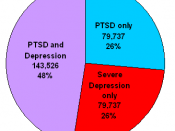Canadians currently have a life expectancy of close to 80 years (Statistics Canada, 2006). This increased lifespan, along with a declining birth rate, has meant that seniors, 65 and older, now represent a large and growing proportion of our population. By 2011 this figure is expected to rise to 5 million, 14 % of the entire population (Martin-Mathews, 2002). Many seniors lead fulfilling lives without significant physical or cognitive changes. They welcome opportunities to pursue interests and activities that were once restricted by obligations of work and family. Approximately one fifth of Canadian men and women aged 55 to 64 and 65 to 74 report that they are satisfied with their life and that they are in good health (Statistics Canada, 2006). However, for other seniors the challenges that come with aging can be debilitating. Physical ailments, mobility issues, chronic pain, cognitive and sensory impairments can all affect one's functional ability.
Other challenges such as retirement, changes in income, widowhood, the loss of friendships through death, and new care-giving responsibilities can lead to social and emotional isolation. Depression is one of the most common mental health problems affecting seniors, yet the condition too often is unrecognized and untreated. Studies have shown that simple preventative methods, specifically exercise may have a significant effect in decreasing the chance of developing depression.
The World Health Organization (2008) defines depression as "a common mental disorder, characterized by sadness, loss of interest or pleasure, feelings of guilt or low self-worth, disturbed sleep or appetite, low energy and poor concentration". Generally, there are two forms of depression, reactive depression and clinical depression. Reactive depression is a state of sadness that is appropriate and of a reasonable level in response to a regulated situation (Meyer, 2005). This state of sadness could occur in response to situations such...


